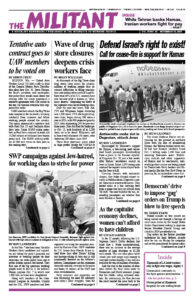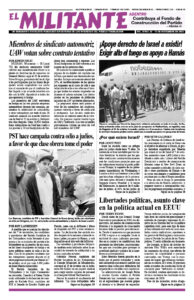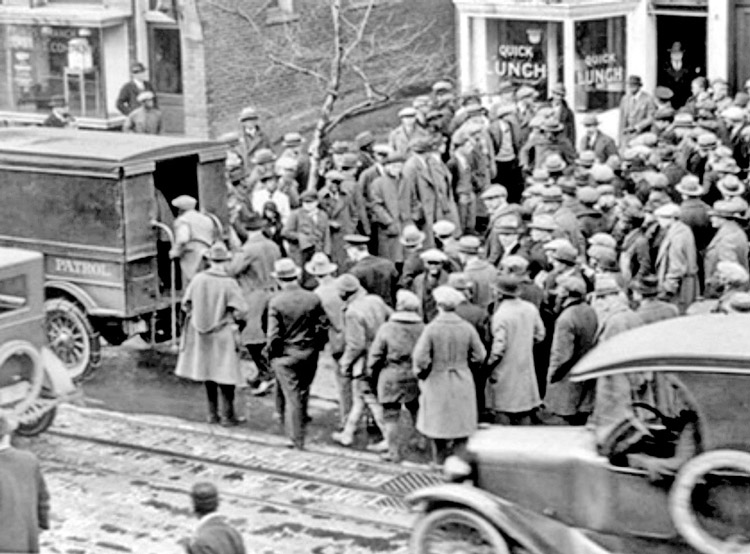Revolutionary Continuity: Birth of the Communist Movement, 1918-1922 by Farrell Dobbs is one of Pathfinder’s Books of the Month for November. The excerpt from “New capitalist repressions” explains how the U.S. rulers trampled on constitutional freedoms to crush union militancy and the young communist movement inspired by the 1917 Bolshevik Revolution. Assaults on political rights today again threaten rights workers need to fight boss attacks. A young leader of the Minneapolis Teamster strikes in 1934, Dobbs went on to lead the Teamster campaign to organize a quarter of a million over-the-road drivers across the Midwest. He was Socialist Workers Party national secretary from 1953 to 1972. The book is the second volume in Dobbs’ series on Marxist leadership. Copyright © 1983 by Pathfinder Press. Reprinted by permission.
The proletarian victory sweeping across the former Russian Empire enabled U.S. workers to perceive more clearly their inherent power as a class, and they wanted to use that power in their expanding fight to wrest concessions from the bosses.
Class-struggle actions of varying dimensions continued throughout 1919, reaching a climax in a huge autumn steel strike. …
The ruling class parlayed its momentum from the victory over the steelworkers into a sweeping offensive against the entire labor movement. On the international arena the offensive coincided with, and was part of, the imperialists’ military, economic, and political drive to strangle the fledgling Russian workers’ state and thus reverse the most devastating blow ever suffered by capitalism anywhere. …
The shock brigade of the government’s vicious witch-hunting was the U.S. Department of Justice, headed by Attorney General A. Mitchell Palmer. Acting for the [Woodrow] Wilson administration, Palmer launched an antired crusade with special emphasis on “alien anarchy.”
For many years the ruling class had been planting spies and provocateurs in the Socialist Party to inform on its members and disrupt it. When the SP split occurred in 1919, the Justice Department’s dirty work was extended into the two new Communist parties. These infiltrators were now used as bird dogs in a dragnet operation intended to tear apart the workers’ vanguard organizations.
The operation was carried out under the immediate supervision of J. Edgar Hoover, who was later to become director of the antilabor, anti-Black Federal Bureau of Investigation.
In November 1919, during the steel strike, the political police had swooped down and arrested several hundred members of the two Communist parties, mainly in New York. This particular raid was intended, among other things, to buttress a phony charge that the steel strike was part of a “Bolshevik plot.” The charges leveled against the Communists implied that they were masterminding the trade union struggles taking place, when in reality their sectarianism had isolated them from the labor upsurge.
Then, at the beginning of 1920, Palmer opened an all-out anticommunist offensive, extending from coast to coast. Federal agents invaded Communist meetings, party headquarters, and the workplaces and homes of individuals. They seized literature, party records, and private correspondence. Firings were encouraged, families were terrorized, and wholesale arrests were made. By the end of January thousands of political militants were in jail on framed-up charges.
Foreign-born workers bore the brunt of the attack. As the January raids began, the political cops were given packets of deportation warrants. These so-called John Doe warrants, issued without naming actual persons, were then used against noncitizens picked up by chance in the federal dragnet. Almost 3,000 alleged communists were arrested in that way. They languished in jails throughout the country, except for those able to get out on bond; and several hundred of them were hustled to Ellis Island, where they were incarcerated pending final orders for their expulsion. In the end, some 750 immigrants were deported as a result of the 1919 and 1920 raids.
The vast scope of the government drive against the foreign born suspected of harboring communist ideas, together with the brutal manner in which it was carried out, sowed fear among immigrant workers generally. This wider consequence of the Palmer raids was, of course, exactly what the capitalist rulers sought to achieve. Basically, their antilabor-anticommunist campaign was intended to curb militancy throughout the entire labor force and keep the workers divided and docile to the boss class.
This colossal frame-up of immigrant workers was accompanied by widespread arrests of other communist leaders on “subversive” charges. When brought to trial in the witch-hunt atmosphere generated by the ruling class, they were usually convicted and given harsh sentences. …
This assault on the communist movement added a new dimension to the general antilabor campaign. State power was used against the working class, as freedom of speech and freedom of assembly came under direct attack. The proletarian vanguard’s right to maintain legal organizations was undermined.
Since a political party cannot exist without having an organizational form, party members have to function as a secret association under particularly severe conditions of repression. But Marxists retreat into such a clandestine method of organizing themselves only as a last resort. Before doing so, they mobilize the maximum support to resist in every possible way capitalist efforts to isolate them from legal, public political life. They fight to uphold their own democratic rights and those of the entire labor movement and its allies. Moreover, Marxists strive to win expansion of those rights for all the exploited and oppressed. They recognize that such a course is imperative if the working-class vanguard is to maintain close touch with the working class as a whole and carry out the all-sided political activity basic to its objectives.


